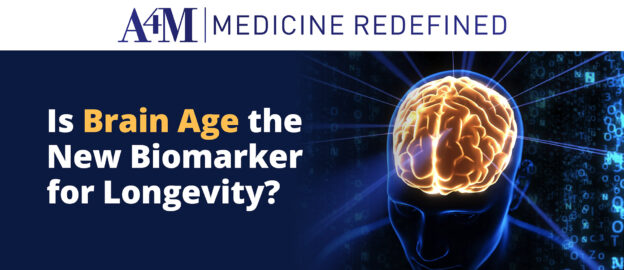Recent advances in longevity science are shifting attention away from chronological age toward more precise biological indicators. Among the most promising is the biological age of the brain. Unlike traditional biomarkers, brain age provides a nuanced snapshot of cognitive health, neurological resilience, and future disease risk. For physicians practicing longevity and precision medicine, this shift opens new pathways for proactive care.
The Clinical Significance of Brain Age
Research published this month in Nature Aging demonstrates that a person’s brain age – estimated through multimodal imaging and protein biomarkers – can predict mortality, dementia risk, and overall healthspan more accurately than chronological age. Investigators assessed more than 3,000 participants using structural MRI data and plasma proteomic analysis to calculate a “brain age gap”: the difference between biological brain age and chronological age.
A positive gap correlated with significantly increased risk of all-cause mortality, Alzheimer’s disease, and cognitive decline. Meanwhile, those with younger-than-expected brain age exhibited decreased risk, regardless of actual age.
These findings validate a growing body of research suggesting that brain aging is not only measurable, but modifiable. And in the context of age management medicine, that opens the door for earlier detection, targeted prevention, and patient-specific intervention.
Measuring Brain Age: A New Diagnostic Frontier
Historically, brain health was assessed reactively after symptoms appeared. But today’s physicians can integrate non-invasive imaging and blood-based biomarkers into a preventive model. Tools that quantify neuroinflammation, synaptic function, and protein homeostasis now allow clinicians to detect subtle neurological changes years before disease onset.
Rather than waiting for cognitive symptoms to manifest, providers can proactively evaluate brain age in asymptomatic individuals as part of a broader longevity plan. Combined with cardiovascular, metabolic, and genomic markers, brain age assessment enhances risk stratification and supports more holistic patient profiling.
Intervening Early: Strategies to Preserve Brain Youth
While research into reversing brain aging is ongoing, clinicians already have powerful tools to preserve brain health. Interventions such as sleep optimization, circadian rhythm alignment, stress reduction, and personalized nootropic support show promise in maintaining neurological vitality. Nutritional strategies targeting neuroinflammation and oxidative stress, particularly diets rich in polyphenols, omega-3s, and B vitamins, may also slow brain aging.
Importantly, the neuroprotective role of quality sleep has become a key clinical focus. Sleep deprivation is strongly linked to accelerated brain aging, impaired glymphatic clearance, and increased amyloid-beta accumulation. As such, optimizing sleep hygiene is not just lifestyle advice, it’s a longevity intervention.
The Future of Age Management: Personalized, Brain-First
As the field of precision medicine evolves, brain age is poised to become a vital metric in longevity-focused clinical practice. Incorporating brain age assessments into annual exams or executive health programs can empower patients with greater agency over their neurological health.
Physicians trained in age management medicine are uniquely positioned to lead this paradigm shift. By combining cutting-edge diagnostics with lifestyle and nutraceutical strategies, clinicians can delay neurodegeneration and promote cognitive longevity well before decline begins.
The future of longevity lies not only in adding years to life, but clarity to the mind and brain age may be the key to unlocking both.
Source:

